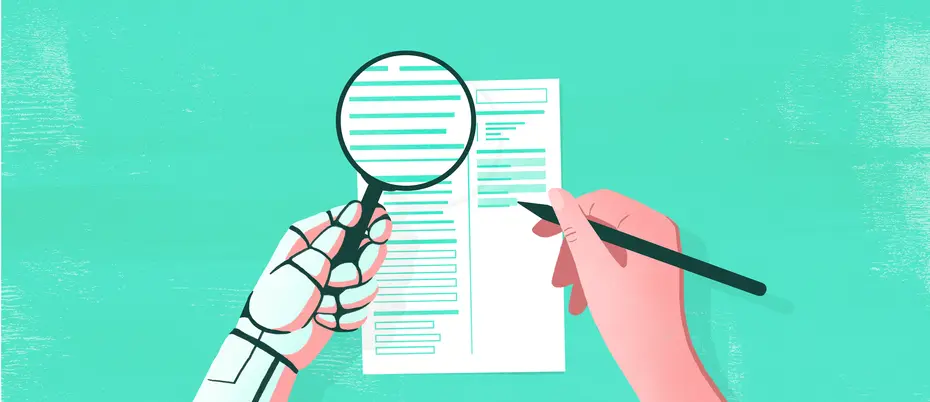Artificial Intelligence
Job seekers with AI-boosted resumes more likely to be hired
Algorithmic writing assistance can help new job seekers find and fix spelling, grammatical, and usage errors in their resumes. Employers approve, research shows.
New job applicants who were randomly assigned algorithmic assistance with their resumes — that is, received help from an interface that offered suggestions to improve spelling and grammar — were 8% more likely to be hired, according to an experiment conducted by MIT Sloan PhD student Emma van Inwegen and co-researchers.
“If you take two identical workers with the same skills and background, the one with the better-written resume is more likely to get hired,” van Inwegen said. “The takeaway is that employers actually care about the writing in the resume — it’s not just a correlation.” That means that AI assistance can be a useful tool for those hoping to get hired, she said.
The results were summarized in a working paper titled “Algorithmic Writing Assistance on Jobseekers’ Resumes Increases Hires,” which was co-authored by MIT Sloan PhD student Zanele Munyikwa and MIT Sloan professor
More offers and higher wages
To examine how the quality of writing on a resume affects hiring, the researchers studied new users participating in a global online labor market for contract work.
The researchers studied 480,948 job seekers who first signed on to the marketplace between June 8 and July 14, 2021. In order of frequency, applicants’ primary job categories were design and creative, writing, administrative support, and software development.
Job seekers who had algorithmic assistance in writing their resume received 7.8% more job offers than those with no help.
While 14% of the job seekers were based in the U.S., more than 80% lived in a country where English is not the native language, including India and Bangladesh. The labor market’s primary language is English.
The researchers intercepted job seekers at the resume-writing stage of the sign-up process and randomly offered half of them algorithmic writing assistance; the other half filled in the resume section of the site without assistance.
Applicants in the treatment group were presented with a tool that offered suggestions for fixing spelling and grammatical errors and gave advice on punctuation, word usage, phrase overuse, tone, and style.
Van Inwegen and her co-authors found that job applicants who had algorithmic assistance received 7.8% more job offers and were more likely to be hired in their first month on the platform than the unassisted control group.
And those with assistance earned wages that were 8.4% higher than the control group’s, making $18.62 per hour on average versus $17.17 per hour for those who had received no resume help.
Errors that turn employers off
The researchers also explored the types of resume writing errors that are most likely to harm applicants’ chances.
Spelling, which the authors called “the most unambiguous measure of writing quality,” topped the list.
Job seekers with more than 99% of the words in their resume spelled correctly were hired nearly three times more in their first month on the platform than those with fewer than 90% spelled correctly. Applicants with fewer than 90% of the words in their resume spelled correctly had only a 3% chance of getting hired in their first month.
Applicants with fewer than 90% of the words in their resume spelled correctly had only a 3% chance of getting hired in their first month.
Job seekers whose resumes included commonly confused words and errors in capitalization, grammar, and typography were also less likely to receive job offers.
But when it came to style errors, specifically “flowery language” — for example, “I will give a task my 100% focus and attention and will only be satisfied once the implementation of the project is finished to your standards or higher” — employers were more forgiving. In fact, they actually preferred this type of language and tended to hire job seekers who used it.
“This implies that despite employers’ dislike of most writing errors, they forgive or even prefer this kind of flowery language,” the researchers write.
Controlling for quality
Concerned that candidates with newly improved resumes may change their job-search behavior and skew the results of the study, the researchers compared the job-search strategies of the assisted group with the nonassisted control group.
“We find no evidence that job seekers changed their search behavior due to the treatment,” they write in their paper. “Treated workers did not send out more applications than workers in the control group, nor did they propose higher wages.
And knowing that employers often use resume writing as a “signaling tool” for the quality of a worker’s overall abilities, van Inwegen and her co-authors were curious to see whether employers ended up feeling less satisfied with the quality of the work performed by people whose resumes were burnished by algorithmic assistance.
The researchers found no evidence that employers were less satisfied with the assisted workers’ services, based on post-work employer ratings or reviews and ongoing demand for their work on the online market.
AI throughout the hiring process
For job seekers, the message is clear: It’s worth taking the extra time to eliminate spelling and grammatical errors and present a higher-quality resume. Algorithmic writing assistance may be a more affordable option than hiring a writer to help, said van Inwegen. “It scales cheaply, and it’s available to the masses,” she said.
Writing help from an algorithm can be especially useful for non-native English speakers applying for jobs, according to the researchers. For example, it could help a skilled coder who lives in Bangladesh and struggles with English spelling and grammar.
Related Articles
“This type of intervention has the potential to level the playing field for applicants who otherwise may not be able to present themselves as well to English-speaking employers,” van Inwegen said.
Employers, too, could benefit; clearer writing would allow them to better identify applicants’ skills, leading a wider pool of qualified applicants from which to hire. “We argue that better writing makes it easier for employers to decide to hire a particular worker,” the researchers write.
Companies could also use algorithmic writing assistance themselves to improve the hiring process. For instance, they could put AI to work writing job descriptions or generating interview questions.
“Employers could use it throughout the hiring process,” van Inwegen said, “and that could potentially make them a more attractive employer.” It’s an area for future research, she added.
Read next: Report finds employees embrace AI when they see its value




